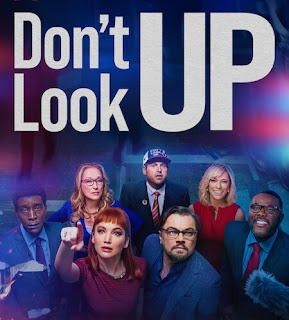Don’t Look Up has been a much-viewed, much-discussed movie this month. There has been a wide variety of comments about that Netflix film both by “professional” movie critics and by amateur reviewers (like me). Unlike some of the professionals, though, I think it was quite significant.
The Grief of Looking Up
Don’t Look Up is ostensibly
about a huge (the size of Mount Everest) comet which is on track to crash into
the earth about six months after when it was discovered by a grad student at Michigan
State University. She and her professor seek to warn the world of the coming
disaster.
Their message of impending doom, however, is
not well received. The media is more concerned with the latest news about
celebrities and the President is more concerned with the upcoming election and the
breaking news about her own personal scandal.
Additionally, wealthy capitalists seek to take
advantage of the looming catastrophe for economic gains. And then soon numerous
science (comet) deniers emerge, rallying under the cry “Don’t look up!”
Even though that is what the film is about on
the surface, it was produced as a satire about the current crisis of climate
change (better labeled as global warming).
A large segment of society—politicians,
capitalists, media personalities, and many of the general public—is like the
science deniers in the film, but their rallying cry for maintaining the unsustainable
present is “Don’t look forward.”
The Grief of Looking Forward
In the past couple of weeks, I have learned
of, and been challenged/shaken by, Michael Dowd. A constantly evolving thinker,
Dowd (b. 1958) is an American progressive Christian minister (ordained by the
UCC) and an “eco-theologian.”
His recent work has been focused on the worldwide
ecological crisis, which he is certain will lead to TEOTWAWKI (the end of the
world as we know it).
My initial introduction to Dowd’s alarming thought
was through two thirty-minute YouTube videos produced in November 2021: “Collapse in a
Nutshell” and “Overshoot
in a Nutshell,” both having the subtitle “Understanding
Our Predicament.”
In addition, I watched (and recommend) Dowd’s 25-minute
video, “Serenity Prayer
for the 21st Century: Pro-Future Love-in-Action,” produced in
June 2021. According to Dowd, “the serenity to accept the things I cannot
change” includes, or is primarily, TEOTWAWKI.
I have many questions and reservations about
Dowd’s disturbing message, but what he presents is certainly something that all
of us critical thinkers must take seriously—and his suggestions on how to deal
with the grief of looking forward may well be very valuable for us all.
So, What Should We Do?
Whether Dowd’s dire analysis is completely correct
or not, of greatest importance is to realize as fully as possible that the
ecological crisis is much more critical than most people, probably including most
of us, have acknowledged.
The result of unchecked global warming is not
just one problem among many equally serious social problems. Indeed, it is not a
problem that will likely be solved; rather it is a predicament from which there
is likely no escape.
If humankind, probably in this century, will likely experience
a collapse of civilization as we know it, what should we do? Dowd’s advice is
to work through the stages of grief, accepting what is most probably
inevitable, but still living each day with joy and thankfulness in spite of the
looming doom.
He emphasizes the need for “adaptive
inattention” to the crisis, seeking the well-being of people now. We can seek to
be agents of calm amidst the coming chaos.
While the film Don’t
Look Up doesn’t deal directly with the grief of looking forward, the final
prayer at the “last supper” of several of the characters in the movie is a
good one for us to pray at this critical time:
Dearest Father and Almighty Creator, we ask for your grace tonight, despite our pride; your forgiveness, despite our doubt. Most of all Lord, we ask for your love to soothe us through these dark times. May we face whatever is to come in your divine will, with courage and open hearts of acceptance. Amen.
_____
**
Even though he is an ordained Christian minister, Dowd says nothing about what
Christians have affirmed for 2,000 years: the coming of a “world without end.” I
am planning for my first blog post in February to be about that.









.jpg)